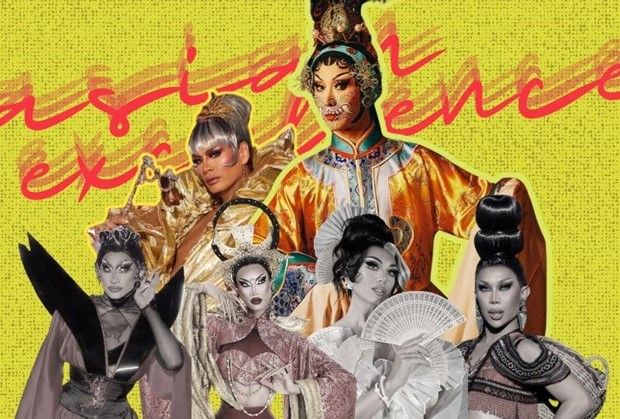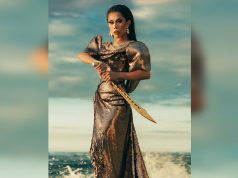In a significant departure from what appears to be a recurring pattern of Asian contestants often ending up as runners-up, Taiwanese American drag queen Nymphia Wind has shattered the so-called “Asian curse” by being crowned the winner of “RuPaul’s Drag Race” Season 16.
Known for her obsession with bananas and the color yellow, Nymphia consistently delivered impressive runway looks and talent with her three wins and zero bottom appearances, ultimately securing victory in the final lipsync for the crown against fellow finalist Sapphira Cristál.
Spoilers ahead! ⚠️ You’re a winner, baby! 💋
Condragulations to America’s Next Drag Superstar! 👑 #DragRace pic.twitter.com/Z7aKqhhtoO
— RuPaul’s Drag Race (@RuPaulsDragRace) April 20, 2024
Throughout the season, Nymphia has proudly represented her Asian heritage, showcasing it in her performances like the Asian Sleeve dance talent show routine in the first episode, down to her boba-inspired finale look, as well as through her fashion choices, which frequently carry significant elements from Asian culture.
Her win makes the 28-year-old drag artist the second Asian winner in the 16-year history of the show’s main franchise. She follows in the footsteps of Dutch-Indonesian American Raja Gemini, who was crowned in Season 3 in 2009, triumphing over Filipino-American drag icon Manila Luzon.
Breaking the ‘Asian curse’
Fans of the show have observed the so-called “Asian curse” in “RuPaul’s Drag Race”, noting a pattern where Asian queens either face early elimination or captivate audiences with their “Asian Excellence,” yet ultimately land as runner-up or in third/fourth place during the finale.
Nymphia addressed this trend in her “Whatcha Packin” interview, stating, “I’m here to break the Asian curse. I’m not gonna be out early on. I just wanted to come here and just show a really rich Asian culture in my drag.”
On social media, netizens rejoiced as Nymphia shattered this so-called curse.
“Asian gays, we finally won today. Congrats, Nymphia”’ cheered user @valmani88.
“Nymphia breaking the Asian curse and avenging the loss of Asian queens who almost made it,” wrote @levy_wong on X.
“It took 13 years but we finally have another Asian queen in the Drag Race US winners Hall of Fame. Condragulations, Nymphia Wind. I am filled with joy and pride. you’re incredible and seeing you showcase your culture and talent has been an incredible experience for me,” another user posted.
it took 13 years but we finally have another asian queen in the drag race us winners hall of fame. condragulations nymphia wind. i am filled with joy and pride. you’re incredible and seeing you showcase your culture and talent has been an incredible experience for me. pic.twitter.com/vpbLz6HCYB
— hugeasmammoth.films (@hugeasmammoth_) April 20, 2024
In the history of the show, only seven Asian queens, including icons like Jujubee, Kim Chi and queens of Filipino heritage like Manila Luzon, PhiPhi Ohara, and last season’s Anetra, have reached the top 4 in their respective seasons. Of these seven, only two won — Raja and Nymphia.
Moreover, the “Asian curse” extends beyond the main franchise. In the recently concluded “Drag Race UK vs The World”, the spotlight shone on Marina Summers, but despite her commanding presence as the “lipsync assassin” of the season, Summers ultimately found herself relegated to third/fourth place.
READ: Marina Summers sends American, British, Spanish ‘Drag Race: UK vs the World’ S2 queens home | ‘Back to defend Motherland’: Marina Summers slays in entrance look at ‘Drag Race: UK vs the World’ S2
Similarly, in Canada’s “Drag Race”, Aurora Matrix emerged as a frontrunner with her creativity and style, yet her journey ended in the runner-up position.
Bringing ‘Asian Excellence’ in reality TV
With each appearance on reality TV shows like “RuPaul’s Drag Race”, “Survivor”, “Big Brother”, among others, Asian contestants proudly showcase their heritage and identity.
Whether it is through their fashion choices, performances, or personal narratives, they offer audiences a glimpse into the multifaceted nature of Asian culture, fostering greater understanding and appreciation.
For example, in an episode of “RPDR” Season 16, Nymphia revealed her challenges growing up in Taiwan, where she felt unattractive by Western beauty standards due to her Asian heritage, which led her to explore makeup and drag as a form of self-expression.
But why do stories like this matter?
In an interview with Interaksyon, @Rooting4Asians, a fan account tracking Asian contestants’ performances in reality TV, underscores how Asian contestants in reality TV demonstrate their competitiveness and bring long-overlooked narratives to the forefront.
He underscored the profound significance for fellow Asians, especially immigrants, who now see themselves represented in these contestants. This is particularly crucial, he emphasized, considering what he described as a history of Asian portrayal in media as a monolithic entity
“These are the stories that have long been withheld from our screens due to lack of representation,” rooting4asians said. “With the recent wins of Taiwanese-American drag queen Nymphia Wind in ‘RPDR 16’, and Jordanian-Australian Feras Basal in ‘Australian Survivor: Titans vs. Rebels’, who also happened to be the first Muslim winner of any English-speaking ‘Survivor’ franchise, there is good progress made in terms of representation in reality tv competitions.”
He further notes efforts being made to improve representation, such as how in 2020, networks like CBS, have set a diversity pledge of 50% POC for their reality shows, which he said led to an increase in Asian winners, such as Filipina Erika Casupanan’s victory in “Survivor 41”, Derek Xiao’s (with his girlfriend Claire Rehfuss) win in “The Amazing Race 34′”, and Jag Bains’ triumph in “Big Brother 25”.
“Seeing people who look like us compete on these shows—whether they do good or not—is already inspiring as it is. Their presence already makes us feel seen and fulfilled, and our support for these contestants comes from wanting to uplift and amplify these stories and inspire others to try joining these shows themselves” he concluded.










